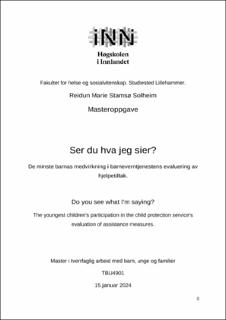| dc.contributor.advisor | | |
| dc.contributor.author | Solheim, Reidun Marie Stamsø | |
| dc.date.accessioned | 2024-04-15T16:10:22Z | |
| dc.date.available | 2024-04-15T16:10:22Z | |
| dc.date.issued | 2024 | |
| dc.identifier | no.inn:inspera:193076646:115036496 | |
| dc.identifier.uri | https://hdl.handle.net/11250/3126625 | |
| dc.description.abstract | Med ny barnevernlov, som trådte i kraft i 2023, ble barns rett til medvirkning i alle forhold som vedrører dem styrket. Mens dette tidligere først og fremst gjaldt barn over 7 år, har denne aldersbegrensningen i retten til medvirkning nå blitt fjernet. Små barns rett til medvirkning reiser en rekke faglige og praktiske spørsmål og utfordringer.
Tema for denne masteroppgave er hvordan barn mellom 0 og 3 år medvirker i evaluering av eget barnevernstiltak. Det empiriske grunnlaget for analysen er et utvalg skriftlige evalueringer av barneverntiltak gjennomført av flere kommunale barneverntjenester på Sørlandet. Teoretisk tar jeg utgangspunkt i utviklingspsykologisk teori. Særlig viktig for analysen er erkjennelsen om at små barn aktivt samhandler med sine omgivelse og at de uttrykker seg blant annet gjennom atferd.
Problemstillingen for oppgaven er:
Hvordan medvirker de yngste barna i barneverntjenestens evalueringer?
Problemstillingen er operasjonalisert gjennom følgende underproblemstillinger:
- Hvordan synliggjøres barn under 3 år i de skriftlige evalueringene?
- På hvilken måte fremkommer barnas uttrykk for meninger i evalueringene av tiltak?
Gjennom analyse av det empiriske materiale fant jeg at de minste barna i liten grad ble beskrevet i evalueringene. Ofte fremkom det ikke informasjon om hvorvidt de ansatte i barneverntjenesten hadde møtt barnet, og vurderinger av observasjon og samhandlingen med barnet. De små barna så ut til å medvirke i evalueringene i svært liten grad. Små barns medvirkning ser i stor grad ut til å forstås som ivaretatt av at voksne arbeider for å støtte og hjelpe barnet for å sikre gode omsorgsvilkår, i stedet for at barna selv blir lyttet til. Beskrivelsene i evalueringene som jeg analyserte tyder på at de ansatte i barnevernet ikke anså at de små barna kunne medvirke, siden de manglet et tydelig språk. Funnene i denne studier tyder på at det er lite bevissthet i barneverntjenesten om små barns evne til å uttrykke seg på andre måter, gjennom deres samhandling med omgivelsene og deres atferd.
Nøkkelord: Medvirkning, de yngste barna, de minste barna, småbarn, barnevern, hjelpetiltak. | |
| dc.description.abstract | With the new Child Protection Act, which came into force in 2023, children's right to participate in all matters that concern them was strengthened. While this previously primarily applied to children over the age of 7, this age restriction on the right to participate has now been removed. Young children's right to participation raises a number of academic and practical questions and challenges.
The topic of this master's thesis is how children between the ages of 0 and 3 participate in the evaluation of their own child protection measures. The empirical basis for the analysis is a selection of written evaluations of child protection measures carried out by several municipal child protection services in Southern Norway. Theoretically, my starting point is developmental psychological theory. Particularly important for the analysis is the recognition that young children actively interact with their surroundings and that they express themselves, among other things, through behaviour.
The thesis question is:
How do the youngest children participate in the child protection service's evaluations?
The problem is operationalized through the following sub-problems:
- How are children under the age of three made visible in the written evaluations?
- In what way do the children's expressions of opinions appear in the evaluations of measures?
Through analysis of the empirical material, I found that the youngest children were to a small extent described in the evaluations. Often there was no information about whether the staff in the child protection service had met the child, and assessments of observation and interaction with the child. The young children seemed to participate in the evaluations to a very small extent. Young children's participation appears largely to be understood as taken care of by adults working to support and help the child to ensure good care conditions, instead of the children themselves being listened to. The descriptions in the evaluations that I analysed indicate that the employees in the child protection did not consider that the young children could participate, since they lacked a clear language. The findings in this study indicate that there is little awareness in the child protection service of young children's ability to express themselves in other ways, through their interaction with their surroundings and their behaviour.
Key words: Key words: Participation, the youngest children, the smallest children, toddlers, child protection, relief measures. | |
| dc.language | nob | |
| dc.publisher | Inland Norway University | |
| dc.title | Ser du hva jeg sier? De minste barnas medvirkning i barneverntjenestens evaluering av hjelpetiltak. | |
| dc.type | Master thesis | |
